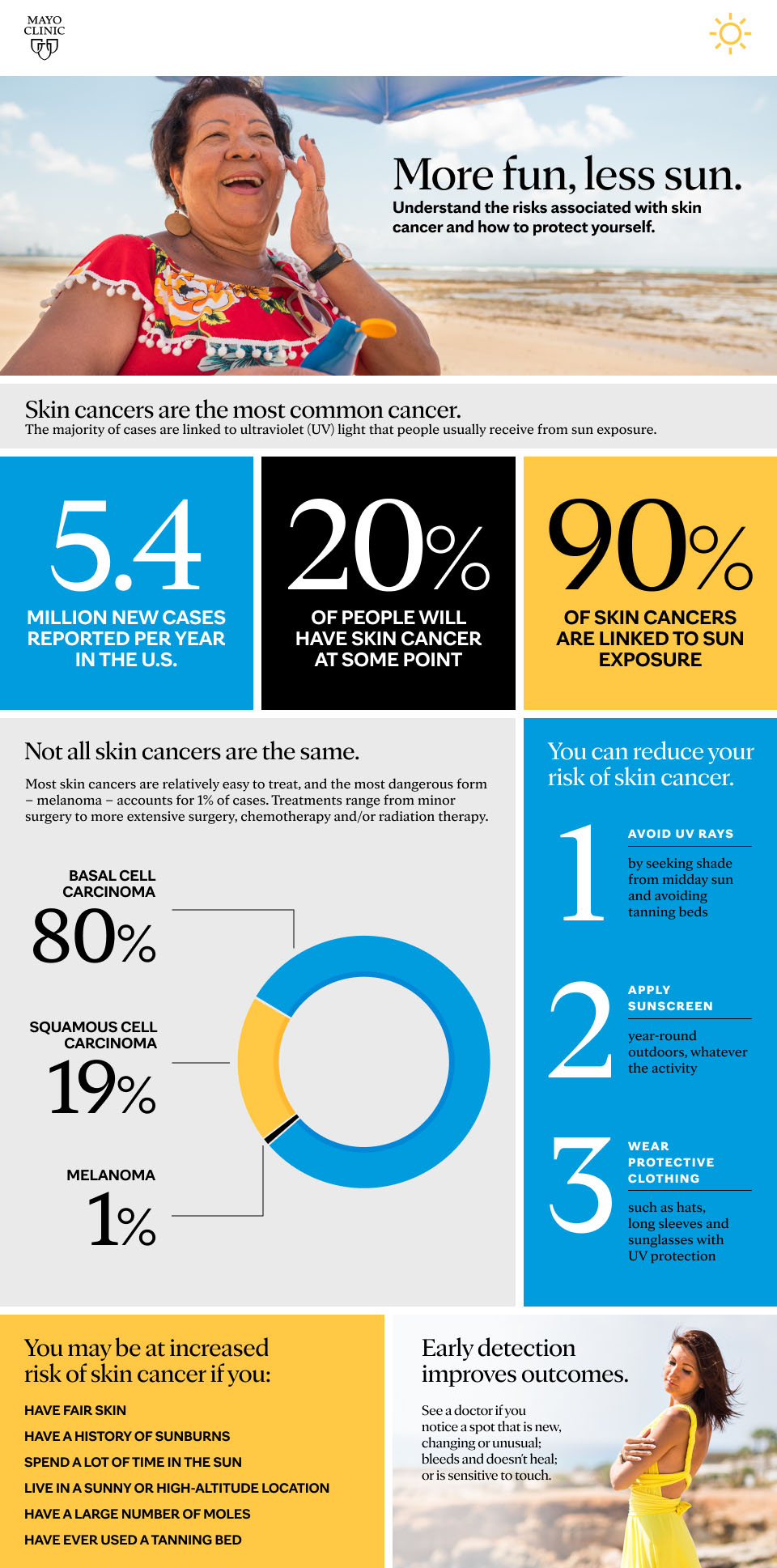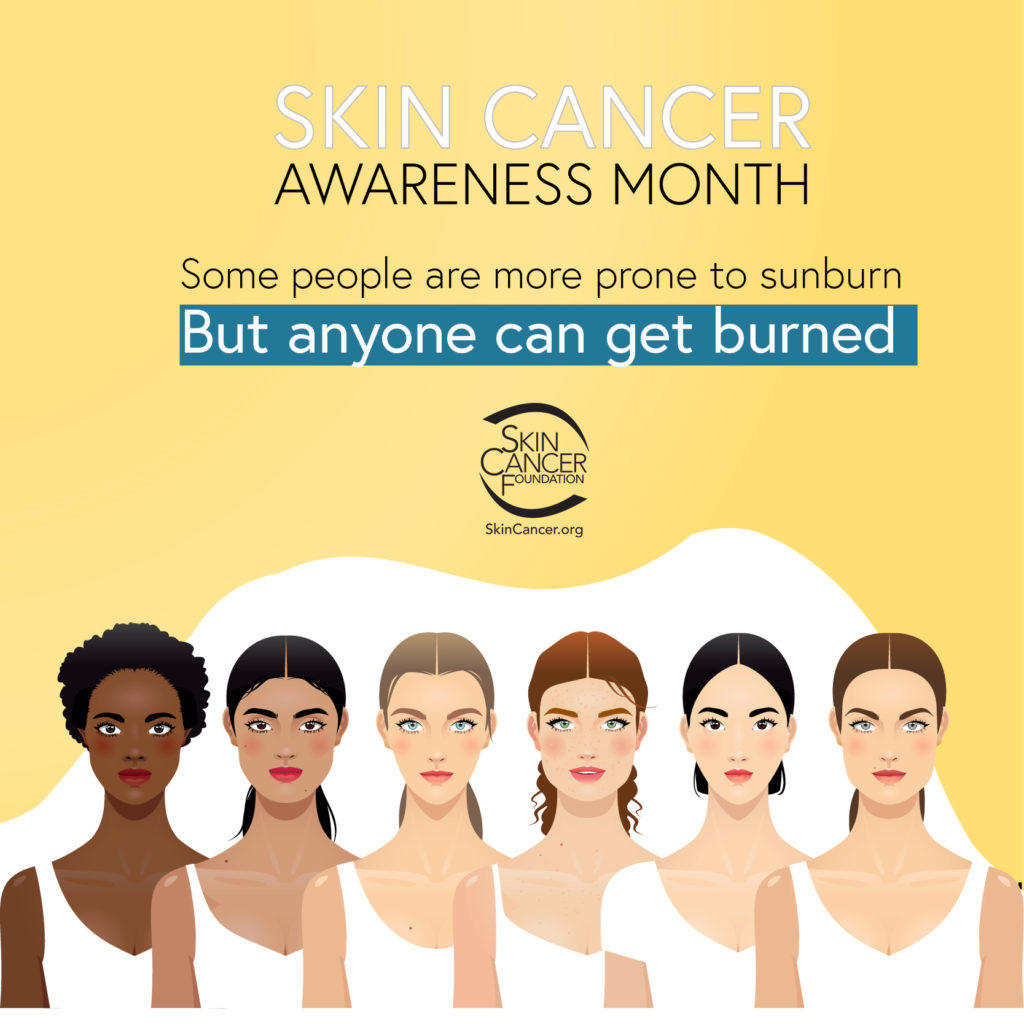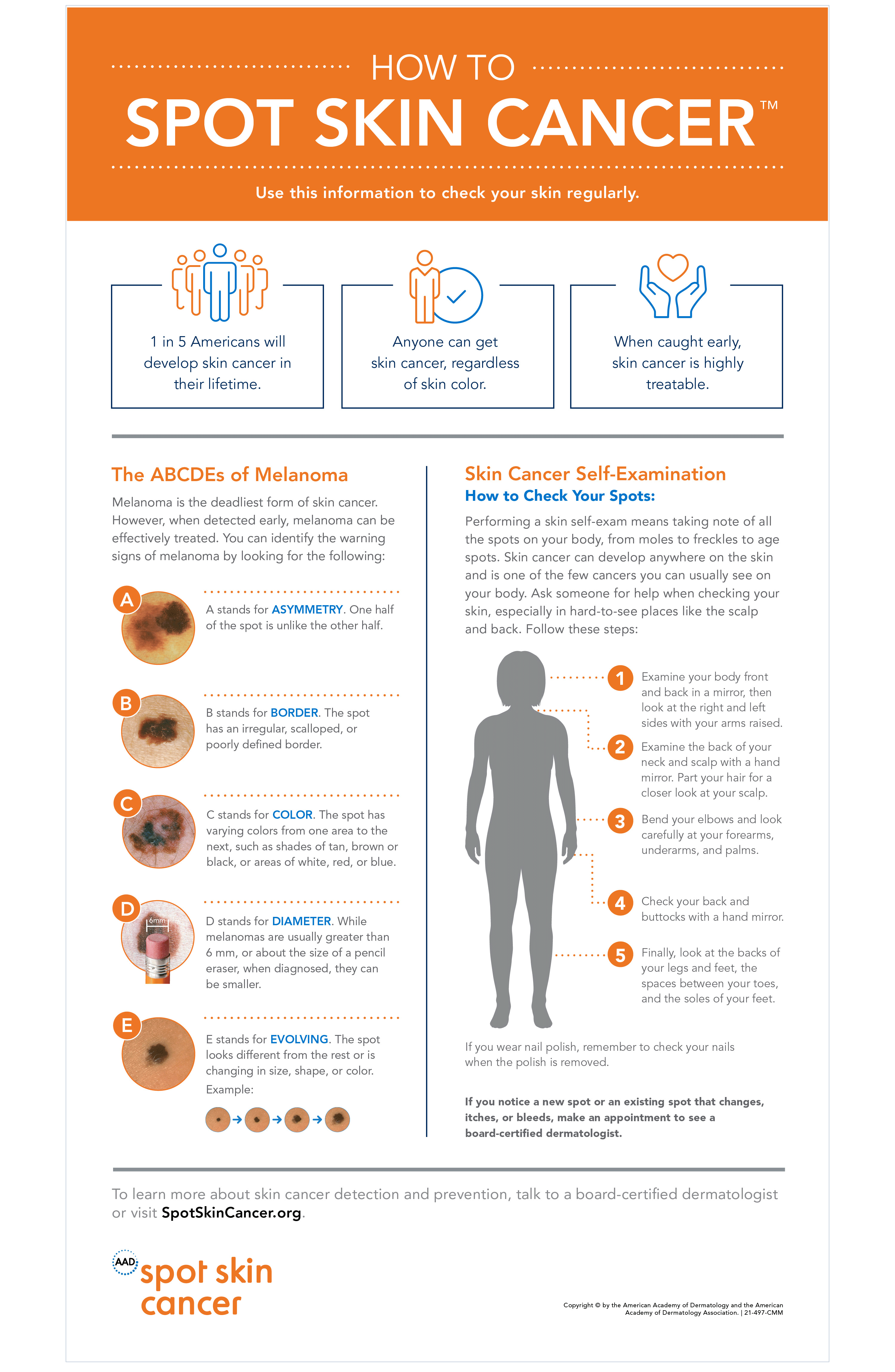“Cancers of the skin (most of which are
basal and squamous cell skin cancers)
are by far the most common of all types of cancer…”.1
Umbrella
What may the Skin Cancer Umbrella include?
Depending on the Source (DotS) this Umbrella may include:
- Basal Cell Carcinoma/Skin Cancer
- Melanoma
- Nonmelanoma/Non Melanoma/Non-Melanoma Skin Cancers
- Skin Cancer
- Squamous Cell Carcinoma/Skin Cancer
Definition
What is skin cancer?
DotS the definition of skin cancer may vary. The (United States) National Cancer Institute’s (NCI) definition is:
- “Skin cancer is a disease in which malignant (cancer) cells form in the tissues of the skin”.2
Types
What are some types of skin cancer?
DotS these may include:
- Melanoma
- Basal Cell Carcinoma
- Squamous Cell Carcinoma
Melanoma
What is melanoma?
DotS the definition of melanoma vary. The NCI’s definition is:
“Melanoma. A form of cancer that begins in melanocytes (cells that make the pigment melanin). It may begin in a mole (skin melanoma), but can also begin in other pigmented tissues, such as in the eye or in the intestines”.3
How common is melanoma?
In the United States according to the American Cancer Society (ACS):
- About 97,610 new melanomas will be diagnosed (about 58,120 in men and 39,490 in women)”.4
In the United Kingdom (UK) according to Cancer Research UK:
Melanoma is the 5th most common cancer in the UK”.5
Basal Cell Carcinoma
What is basal cell carcinoma?
DotS the definition of basal cell carcinoma may vary. The NCI’s definition is:
“Basal Cell Carcinoma
Cancer that begins in the lower part of the epidermis (the outer layer of the skin). It may appear as a small white or flesh-colored bump that grows slowly and may bleed. Basal cell carcinomas are usually found on areas of the body exposed to the sun. Basal cell carcinomas rarely metastasize (spread) to other parts of the body. They are the most common form of skin cancer. Also called basal cell cancer”.6
Squamous Cell Carcinoma
What is squamous cell carcinoma?
DotS the definition of squamous cell carcinoma may vary. The NCI’s definition is:
“Squamous Cell Carcinoma
Cancer that begins in squamous cells. Squamous cells are thin, flat cells that look like fish scales, and are found in the tissue that forms the surface of the skin, the lining of the hollow organs of the body, and the lining of the respiratory and digestive tracts. Most cancers of the anus, cervix, head and neck, and vagina are squamous cell carcinomas. Also called epidermoid carcinoma”.7
How common are basal and squamous cell carcinoma?
In the U.S. according to the ACS:
“Cancers of the skin (most of which are basal and squamous cell skin cancers) are by far the most common of all types of cancer in the United States. According to one estimate, about 5.4 million basal and squamous cell skin cancers are diagnosed each year in the US (occurring in about 3.3 million people, as some people have more than one). About 8 out of 10 of these are basal cell cancers. Squamous cell cancers occur less often”.8
In the United Kingdom (UK) according to Cancer Research UK:
Cause
What may cause skin cancer?
In How Does the Sun and UV Cause Cancer? How Does UV Cause Skin Cancer? Cancer Research UK elaborate on:
“Too much UV radiation from the sun or sunbeds can damage the DNA in our skin cells. DNA tells our cells how to function. If enough DNA damage builds up over time, it can cause cells to grow out of control, which can lead to skin cancer”.10
Early Detection
What skin changes may be cancer?
In Skin Cancer: Skin Cancer Signs and Symptoms the Cancer Council Australia note:
- Any crusty, non-healing sores
- Small lumps that are red, pale or pearly in colour
- New spots, freckles or any moles changing in colour, thickness or shape over a period of weeks to months”.11
In Find Skin Cancer: How To Perform A Skin Self-Exam. the American Academy of Dermatology (AAD) explain:
Health Care Provider
What if I have some skin changes, including down there?
If you have some skin changes – anywhere, including “down there” – it may be in your best interest to choose to talk to your health care provider about this as soon as possible.
In Find Skin Cancer: How To Perform A Skin Self-Exam the AAD also note:
Health Topics A-Z
Where may I find Health Topics A-Z related to Skin Cancer?
In Health Topics A-Z you may find:
Links
Where may I find Links related to Skin Cancer?
Your Country may have Links similar to:
Links
This Links List to third party websites is neither comprehensive nor exhaustive. Inclusion on this Links List does not imply endorsement or recommendation. Non-inclusion on this Links List does not imply non-endorsement or non-recommendation. Third party websites are not under the control of Meno Martha International Menopause Directory. Third party websites may contain explicit medical images and/or sexual references. Please read Meno Martha International Menopause Directory’s Links Policy before proceeding to a Link. Please contact Webmaster if you experience a problem with a Link.New or Updated
- Be Sun Savvy, Protect Yourself From Skin Cancer [15 June 2024]
- Mayo Clinic Minute: Common Types of Skin Cancer [28 May 2024] [+ Video Courtesy: Mayo Clinic News Network]
- Mayo Clinic Q and A: Screening for Skin Cancer: Who Is At Risk? [22 August 2024]
- Protect Your Skin During Heat Waves — Here’s How [15 August 2024]
- Removing Skin Cancer With Mohs Surgery [13 June 2024]
- Why Experts Say To Avoid Beer Tanning [03 June 2024]
- A To Z of Skin
- About Basal and Squamous Cell Skin Cancer
- American Academy of Dermatology
- Back To Basics: Understanding the World’s Most Common Cancer
- Basal Cell Skin Cancer
- Basal and Squamous Cell Skin Cancer
- Be Safe In the Sun
- Be Sun Savvy, Protect Yourself From Skin Cancer
- Check Moles During Skin Cancer Awareness Month
- Find Skin Cancer: How To Perform A Skin Self-Exam [+ Video]
- Getting Diagnosed
- How Can I Tell If I Have Skin Cancer?
- How Do Sunbeds Cause Cancer?
- How Does the Sun and UV Cause Skin Cancer?
- How To Do A Skin Self-Exam
- How To Prevent Skin Cancer
- Infographic: Skin Cancer

- Is Sunscreen Bad for You?
- Knowing Your Risk for Skin Cancer May Limit Unhealthy Behaviors
- May Is Skin Cancer Awareness Month [United States]
- May Is Skin Cancer Awareness Month [United States]

- Mayo Clinic Minute: 3 Types of Skin Cancer [+ Video Courtesy: Mayo Clinic News Network]
- Mayo Clinic Minute: Common Types of Skin Cancer
- Mayo Clinic Minute: Learning the ABCDEs of Melanoma [+ Video Courtesy: Mayo Clinic News Network]
- Mayo Clinic Minute: Melanoma Misconception — Dark Skin Tones At Risk, Too [+ Video Courtesy: Mayo Clinic News Network]
- Mayo Clinic Minute: Sunscreen Has A Shelf Life and Other Facts To Know [+ Video Courtesy: Mayo Clinic News Network]
- Mayo Clinic Minute: Treating Skin Cancer With Mohs Surgery [+ Video Courtesy: Mayo Clinic News Network]
- Mayo Clinic Minute: Who Should Be Screened for Skin Cancer? [+ Video Courtesy: Mayo Clinic News Network]
- Mayo Clinic Q and A: Bleeding Moles and Skin Checks
- Mayo Clinic Q and A: Screening for Skin Cancer: Who Is At Risk?
- Melanoma
- Melanoma Skin Cancer
- Melanoma Skin Cancer
- Melanoma Skin Cancer [Topics]
- Melanoma Skin Cancer: Symptoms
- Merkel Cell Skin Cancer
- Moles: Mole Self-Assessment
- National Council on Skin Cancer Prevention [United States]
- Protect Your Skin During Heat Waves — Here’s How
- Removing Skin Cancer With Mohs Surgery
- Risk Factors for Skin Cancer
- Science In 5: Episode #111 – Sun and Skin Cancer
- Skin Cancer
- Skin Cancer
- Skin Cancer
- Skin Cancer
- Skin Cancer
- Skin Cancer
- Skin Cancer
- Skin Cancer (Melanoma)
- Skin Cancer (Melanoma) – ABCDE of Moles [Slide Show]
- Skin Cancer (Non-Melanoma)
- Skin Cancer 101
- Skin Cancer 101: What Is Skin Cancer? [+ Images]
- Skin Cancer Diagnosis
- Skin Cancer Diagnosis Highlights Importance of Annual Checks
- Skin Cancer Prevention
- Skin Cancer Prevention (PDQ)–Patient Version
- Skin Cancer Prevention and Early Detection
- Skin Cancer Screening (PDQ)–Patient Version
- Skin Cancer Survivors: How To Stay Safe In the Sunshine
- Skin Cancer Treatment (PDQ)–Patient Version
- Skin Cancer Videos
- Skin Cancer: Everyone’s At Risk
- Skin Cancer: Reducing Risk for Skin Cancer
- Skin Cancer: Skin Cancer Basics
- Skin Cancer: Skin Cancer Risk Factors
- Skin Cancer: Sun Safety Facts
- Skin Cancer: Symptoms of Skin Cancer
- Skin Cancer: What Is Skin Cancer?
- Skin Care and Aging: Skin Cancer
- Sun Safety Facts
- Sun, UV and Cancer
- Sunburn Treatment: What Works?
- Sunscreen and Sun Safety
- Sunscreen: How To Help Protect Your Skin From the Sun
- Tanning, Fake Tan and Melanotan
- The Difference Between Mineral and Chemical Sunscreens
- The Risks of Tanning
- Tips To Stay Safe in the Sun: From Sunscreen To Sunglasses
- Types of Skin Cancer
- UV (Ultraviolet) Radiation and Cancer Risk
- Ultraviolet Radiation
- Video: Skin Cancer – How Skin Cancer Develops
- Vitamin D and Sun Safety
- Vulvar Cancer
- What Does A Mole Look Like? [+ Photos of Moles]
- What Does Melanoma Look Like? [+ Photos of Melanomas]
- What To Look for: ABCDEs of Melanoma
- What You Need To Know About Skin Cancer
- Why Do I Get White Spots on My Skin From the Sun?
- Why Experts Say To Avoid Beer Tanning
Sources
Where may I find the Sources quoted?
You may find the Sources quoted at:
Sources
- About Basal and Squamous Cell Skin Cancer: Key Statistics for Basal and Squamous Cell Skin Cancers. Last Revised: 31 October 2023. American Cancer Society https://www.cancer.org/cancer/basal-and-squamous-cell-skin-cancer/about/key-statistics.html Accessed: 01 May 2024
- Skin Cancer Prevention (PDQ)–Patient Version: General Information About Skin Cancer – Key Points. Updated: 23 October 2023. National Cancer Institute https://www.cancer.gov/types/skin/patient/skin-prevention-pdq#section/_4 Accessed: 01 May 2024
- NCI Dictionary of Cancer Terms: Melanoma. National Cancer Institute https://www.cancer.gov/publications/dictionaries/cancer-terms/expand/M Accessed: 01 May 2024
- About Melanoma Skin Cancer: Key Statistics for Melanoma Skin Cancer – How Common Is Melanoma? Last Revised: 31 October 2023. American Cancer Society https://www.cancer.org/cancer/melanoma-skin-cancer/about/key-statistics.html Accessed: 01 May 2024
- Melanoma Skin Cancer: What Is Melanoma Skin Cancer? How Common Is Melanoma Skin Cancer? Last Reviewed: 02 February 2024. Cancer Research UK https://about-cancer.cancerresearchuk.org/about-cancer/melanoma/about Accessed: 01 May 2024
- NCI Dictionary of Cancer Terms: Basal Cell Carcinoma. National Cancer Institute https://www.cancer.gov/publications/dictionaries/cancer-terms/expand/B Accessed: 01 May 2024
- NCI Dictionary of Cancer Terms: Squamous Cell Carcinoma of the Skin. National Cancer Institute https://www.cancer.gov/publications/dictionaries/cancer-terms/expand/S Accessed: 01 May 2024
- About Basal and Squamous Cell Skin Cancer: Key Statistics for Basal and Squamous Cell Skin Cancers. Last Revised: 31 October 2023. American Cancer Society https://www.cancer.org/cancer/basal-and-squamous-cell-skin-cancer/about/key-statistics.html Accessed: 01 May 2024
- Skin Cancer: What Is Skin Cancer? – How Common Is Skin Cancer? Last Reviewed: 16 December 2022. Cancer Research UK https://about-cancer.cancerresearchuk.org/about-cancer/skin-cancer/about-skin-cancer Accessed: 01 May 2024
- How Does the Sun and UV Cause Cancer? How Does UV Cause Skin Cancer? Last Reviewed: 30 November 2023. Cancer Research UK https://www.cancerresearchuk.org/about-cancer/causes-of-cancer/sun-uv-and-cancer/how-the-sun-and-uv-cause-cancer Accessed: 01 May 2024
- Skin Cancer: Skin Cancer Signs and Symptoms. Cancer Council Australia https://cancer.org.au/cancer-information/types-of-cancer/skin-cancer Accessed: 11 August 2024
- Find Skin Cancer: How To Perform A Skin Self-Exam. Last Updated: 15 May 2023. American Academy of Dermatology https://www.aad.org/public/spot-skin-cancer/learn-about-skin-cancer/detect Accessed: 01 May 2024
- Find Skin Cancer: How To Perform A Skin Self-Exam. Last Updated: 15 May 2023. American Academy of Dermatology https://www.aad.org/public/spot-skin-cancer/learn-about-skin-cancer/detect Accessed: 01 May 2024




